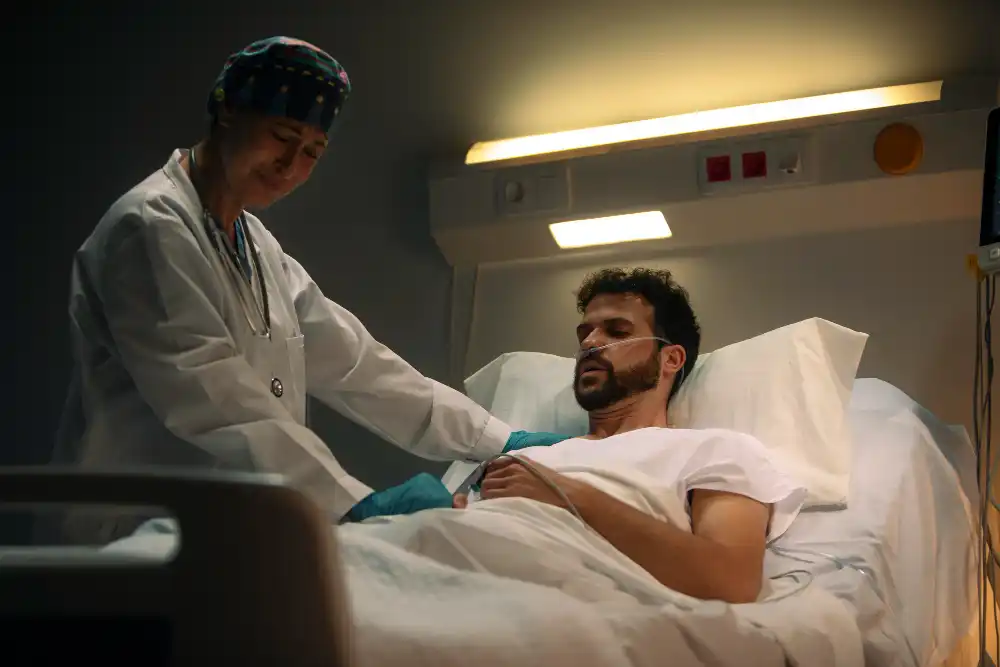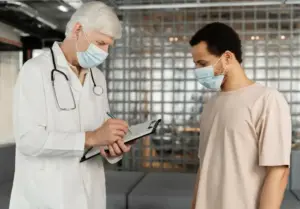Comprehensive Critical Care Services for Emergency
Advanced life-saving Critical Care services ensuring continuous monitoring and expert treatment.

Critical Care
In moments when life hangs by a thread, every second matters. That’s where Critical Care comes in the heartbeat of modern hospitals, designed to stabilize, support, and save patients in life-threatening situations. At VS Hospitals, Chennai, the Department of Critical Care provides advanced, round-the-clock, multidisciplinary care for patients battling severe illnesses, injuries, or complications.
Here, precision meets compassion. Every patient receives personalized treatment in a controlled, technology-driven environment with constant medical supervision. The goal isn’t just survival it’s recovery with dignity and quality of life.

Early Detection Saves Lives
Early detection and treatment are crucial for improving the chances of survival. If you notice any concerning symptoms, consult a healthcare provider immediately.
Signs and Symptoms
Breathing Difficulties
Difficulty breathing or shortness of breath is one of the most critical signs indicating respiratory distress or failure. It requires immediate medical attention to prevent oxygen deprivation.
Chest Pain or Palpitations
Severe chest pain or irregular heartbeat could signal a heart emergency.
Loss of Consciousness
Sudden fainting or unresponsiveness may suggest stroke or cardiac arrest.
Confusion or Disorientation
Sudden confusion can result from low oxygen or severe infection.
Extreme Weakness
Inability to move or extreme fatigue may indicate serious illness or infection.
Seizures or Fits
Continuous seizures require immediate medical stabilization.
Abnormal Blood Pressure or Pulse
Rapid pulse or low blood pressure suggests circulatory problems.
Severe Trauma or Bleeding
Uncontrolled bleeding or injury can lead to shock and needs emergency care.
Changes in Skin Color
Blue or pale skin shows poor oxygen flow or circulation.
Persistent Fever with Low Oxygen
High fever and low oxygen may signal sepsis or severe infection.
Blood in Urine
Hematuria - pink, red, or dark urine, the most common symptom
Frequent Urination
Feeling the need to urinate frequently, even when bladder is not full
Painful Urination
Experiencing pain or burning sensation while urinating
Back or Pelvic Pain
Pain that occurs as the cancer grows and spreads
Unexplained Weight Loss
Significant weight loss not related to diet or exercise
Fatigue
Feeling unusually tired or weak without a clear cause
Meet Our Expert Critical Care
Risk Factors
Smoking
Smoking is one of the leading causes of bladder cancer. Chemicals in tobacco smoke can damage the lining of the bladder, increasing the risk.

Gender
Men are at a higher risk of developing bladder cancer than women.

Chronic Bladder Infections or Inflammation
Conditions such as bladder infections and long-term bladder inflammation can increase the risk.

Exposure to Chemicals
Prolonged exposure to certain chemicals, especially those used in the dye industry, rubber production, and chemical manufacturing, increases the risk.

Chronic diseases
Diabetes, hypertension, COPD, heart failure, or kidney disease.

Age
Elderly individuals are at higher risk due to weaker immunity and multiple comorbidities.

Severe infections
Sepsis or pneumonia can lead to multi-organ dysfunction.

Post-surgical complications
Especially after cardiac or abdominal surgeries.

Accidents and trauma
Road accidents, fractures, or internal injuries.

Lifestyle habits
Smoking, excessive alcohol consumption, or drug abuse.

Weak immune system
Cancer, HIV, or prolonged steroid use.

Obesity
Increases the risk of respiratory and cardiovascular complications

Critical Care
Diet and Nutrition
Prevention
Diagnosis
Key Services
Key Facilities
Nutrition is often overlooked during critical illness but it plays a pivotal role in recovery. VS Hospitals integrates medical nutrition therapy into every patient’s care plan to support healing and immune strength.
Nutritional Guidelines for Critical Care Patients:
- Early Enteral Nutrition: Feeding via tube within 24–48 hours of ICU admission to maintain gut integrity
- Protein-Rich Diet: Promotes tissue repair and prevents muscle wasting
- Calorie-Optimized Meals: Tailored energy intake based on metabolic needs
- Micronutrient Support: Vitamins, minerals, and antioxidants to aid recovery
- Hydration Balance: Monitored fluid intake to prevent dehydration or overload
- Special Diets: Customized for patients with diabetes, renal failure, or cardiac conditions
Prevention of critical illness starts long before ICU admission. At VS Hospitals, our focus extends beyond treatment — we promote preventive health strategies to reduce hospitalizations.
Preventive Measures Include:
- Routine Health Check-ups: Early detection of cardiac or metabolic diseases
- Vaccination: Prevents infections like pneumonia, influenza, and COVID-19
- Healthy Lifestyle: Balanced diet, exercise, and avoidance of tobacco/alcohol
- Timely Medical Consultation: Immediate care for symptoms like breathlessness, chest pain, or fever
- Post-Surgical Monitoring: Regular follow-ups to detect complications early
- Infection Control Practices: Proper hygiene, handwashing, and sterilization protocols
VS Hospitals also educates families on home-based preventive practices empowering them to act early during medical crises.
Swift, precise, and technology-driven diagnostics are vital for effective critical care management.
- Comprehensive Clinical Assessment
Doctors perform rapid evaluations of medical history, symptoms, and vital signs. - Continuous Monitoring
Real-time tracking of ECG, oxygen levels, and blood pressure ensures instant alerts to changes. - Laboratory Investigations
Blood tests and ABG analysis help assess infection, organ health, and oxygen balance. - Imaging and Scans
X-rays, CT, MRI, and ultrasound detect internal injuries and complications. - Specialized Tests
Echocardiograms, neurological, and pulmonary assessments support accurate diagnosis. - Multidisciplinary Consultation
Experts from multiple specialties collaborate to design precise treatment plans.
Comprehensive 24/7 life support and monitoring for patients with severe or life-threatening conditions.
- 24/7 Emergency and ICU Support: Immediate admission, stabilization, and round-the-clock monitoring of critically ill patients.
- Advanced Ventilatory Support:Invasive and non-invasive mechanical ventilation for patients with respiratory failure.
- Cardiac and Hemodynamic Monitoring: Continuous tracking of heart activity and circulation using advanced monitoring systems.
- Post-Surgical Critical Care: Dedicated units for cardiac, neurological, and trauma recovery after surgery.
- Sepsis and Infection Management: Rapid detection and treatment of severe infections to prevent organ failure.
- Renal Replacement Therapy: Bedside dialysis and continuous renal support for patients with kidney failure.
- Nutritional and Metabolic Support: Customized diet and metabolic management to enhance patient recovery.
- Neurological Intensive Care: Comprehensive care for stroke, coma, and brain injury cases with advanced monitoring.
- Trauma and Accident Care: Multidisciplinary approach for managing complex trauma and accident-related injuries.
- Pain and Sedation Management: Expertly balanced pain control and sedation for patient comfort and safety.
The Critical Care Unit at VS Hospitals is a state-of-the-art facility designed to meet global healthcare standards, ensuring precision, safety, and patient comfort. It is one of Chennai’s most advanced intensive care environments, providing continuous monitoring and life-saving interventions.
- Dedicated Intensive Care Units (ICU, CCU, NICU, MICU, SICU): Specialized units for cardiac, neonatal, medical, and surgical emergencies.
- Advanced Life Support Equipment: Equipped with modern ventilators, defibrillators, and infusion pumps.
- Real-Time Patient Monitoring Systems: Centralized systems track vital signs and parameters 24/7.
- Round-the-Clock Specialist Availability: Critical care experts, anesthesiologists, and nurses available at all times.
- Isolation Wards: Infection-controlled rooms for patients requiring specialized containment.
- 24/7 Laboratory & Imaging Support: Immediate access to CT, MRI, X-ray, and full lab services.
- Infection Control & Safety Protocols: Strict sanitization, hygiene, and antibiotic management programs in place.
- Pharmacy and Blood Bank Support: Rapid availability of emergency medications and blood transfusion units.
- Family Counseling Rooms: Private spaces for doctors to update and guide patient families.
- Post-ICU Rehabilitation Programs: Comprehensive physiotherapy and nutrition support for complete recovery.
Top Medical Facilities at Our Multispeciality Hospital – Here’s What Makes Us Different!
Ready to Begin Your Critical Care Journey?
Learn More About Critical Care
Frequently Asked Questions
The Critical Care Unit admits patients with life-threatening conditions such as respiratory failure, cardiac arrest, trauma, stroke, or sepsis. It also caters to postoperative patients who need intensive monitoring after major surgeries. The goal is to stabilize and restore vital organ functions through round-the-clock specialized care.
VS Hospitals follows strict international safety protocols, including infection control, sterilized equipment, and constant monitoring. Each ICU patient is attended by trained critical care staff and specialists. The hospital also uses advanced digital monitoring systems to ensure real-time alerts, minimizing risks and improving patient safety.
Yes, VS Hospitals allows controlled family visits in the ICU with proper hygiene measures. Family counseling sessions are held daily where doctors explain the patient’s progress and treatment plan. This approach ensures transparency, emotional support, and confidence for the patient’s loved ones during critical situations.
